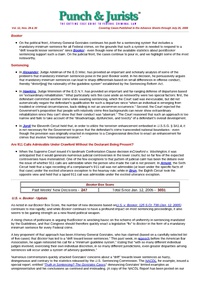Loaded on
July 1, 2005
published in Punch and Jurists
July 25, 2005
As set forth in Guideline Amendment 526, § 120004 of the Violent Crime and Law Enforcement Act of 1994 directed the Sentencing Commission “to provide for an appropriate enhancement for any felony that involves or is intended to promote international terrorism.” In partial response to that directive, the Sentencing …
Loaded on
July 1, 2005
published in Punch and Jurists
July 25, 2005
It always amuses us how badly the Second Circuit underestimates the tenacity and the depth of conviction of Judge Jack Weinstein, perhaps the most legendary figure in the American judicial system today. In the instant case, the Second Circuit seemed to be a bit queasy about approving a downward …
Loaded on
July 1, 2005
published in Punch and Jurists
July 25, 2005
In defendant's capital case, the parties were in the midst of voir dire. Each potential juror was required to fill out an extensive questionnaire, including standard voir dire questions and questions about personal history, knowledge of the case, and death penalty opinions. Each juror was then questioned individually by …
Loaded on
July 1, 2005
published in Punch and Jurists
July 25, 2005
Defendant-appellee employee of a company that allegedly recruited illegal aliens to work in the United States was indicted for interfering with the government's investigation, and was charged with, inter alia, destruction or removal of property to prevent seizure in violation of 18 U.S.C.S. § 2232(a). The United States District …
Loaded on
July 1, 2005
published in Punch and Jurists
July 25, 2005
The defendant, Samuel Alexander,was first arrested and charged by state officials for drug and weapon possession; but those charges were later dropped in favor of a Federal prosecution because it carried higher penalties. The Federal charges resulted in a three count indictment: carrying a firearm during a drug trafficking …
Loaded on
July 1, 2005
published in Punch and Jurists
July 25, 2005
In 1992, defendant pleaded guilty and was sentenced to 22 years' imprisonment for his role in a murder. After concluding that defendant had been denied due process when the U.S. violated its constitutional duty to disclose important exculpatory evidence to the defense before trial, the court, pursuant to 28 …
Loaded on
July 1, 2005
published in Punch and Jurists
July 25, 2005
U.S. v. Arnold, 410 F.3d 895 (6th Cir. 06/21/05) (Judge Carman)
U.S. v. Brun, 416 F.3d 703 (8th Cir. 08/01/05) (Judge Heaney)
In Crawford v. Washington, 541 U.S. 36 (2004), the Supreme Court held that the Confrontation Clause bars the admission of testimonial hearsay unless the declarant is unavailable …
Loaded on
July 1, 2005
published in Punch and Jurists
July 25, 2005
Petitioner inmate filed a motion under 28 U.S.C. § 2255 to vacate, set aside, or correct his sentence of 22 years in prison following his pleading guilty to violating 18 U.S.C. § 1952B(b)(1), (2).
The inmate, along with his co-defendants, pleaded guilty to conspiring to assault and beat the …
Loaded on
July 1, 2005
published in Punch and Jurists
July 25, 2005
In this case the Sixth Circuit emphatically held that "restitution is not subject to Booker analysis because the statutes authorizing restitution, unlike ordinary penalty statutes, do not provide a determinate statutory maximum." In its detailed analysis of that restitution issue, the Court stated:
"It is true that under Sixth …
Loaded on
July 1, 2005
published in Punch and Jurists
July 25, 2005
U.S. v. Arnold, 410 F.3d 895 (6th Cir. 06/21/05) (Judge Carman)
U.S. v. Brun, 416 F.3d 703 (8th Cir. 08/01/05) (Judge Heaney)
In Crawford v. Washington, 541 U.S. 36 (2004), the Supreme Court held that the Confrontation Clause bars the admission of testimonial hearsay unless the declarant is unavailable …
Loaded on
July 1, 2005
published in Punch and Jurists
July 25, 2005
The specific issue before the Court in this case was whether a state conviction for being a minor in possession of alcohol is "countable" under § 4A1.2(c) of the Guidelines for purposes of calculating a federal defendant's criminal history score. That question required the Court to adopt for the …
Loaded on
July 1, 2005
published in Punch and Jurists
July 25, 2005
Here the Court held that a probationer who provides incriminating information to his probation officer, pursuant to a probation condition that requires him to answer all inquiries truthfully, is compelled to give incriminating evidence within the meaning of the Fifth Amendment and that information may not thereafter be used …
Loaded on
July 1, 2005
published in Punch and Jurists
July 25, 2005
Here the Court held that the admission of evidence of the defendant’s prior arrest for drug dealing was clearly erroneous, and because the Court could not say that the error did not substantially influence the jury’s decision, the defendant’s drug conviction was reversed. The Court labeled as “preposterous” the …
Loaded on
July 1, 2005
published in Punch and Jurists
July 25, 2005
Defendant, who was on trial for capital murder, challenged a juror for cause, arguing that the juror was not able to fairly consider certain kinds of mitigating evidence and impartially weigh expert testimony from psychiatrists or psychologists.
Although the juror expressed moderate and balanced views on the death penalty, …
